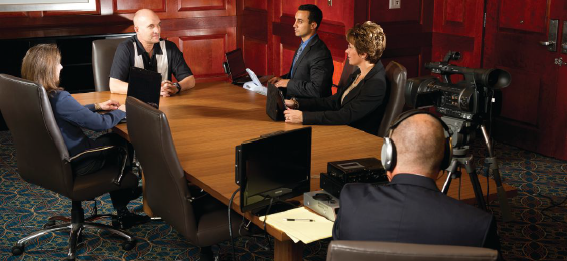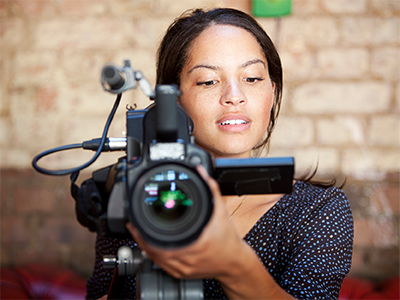The Role of Legal Videography in Depositions and Tests
Lawful videography has arised as an essential device in both depositions and trials, offering a multifaceted strategy to recording witness testimonies. By capturing not just the spoken word but additionally the subtleties of non-verbal communication, this tool improves the reliability of testaments and protects vital evidence for future procedures (legal videography). As legal specialists progressively recognize its worth, it prompts a much deeper examination of just how these aesthetic records can affect juror perceptions and test outcomes. What effects might these advancements hold for the future of lawful method?

Relevance of Legal Videography
Legal videography plays a crucial role in the paperwork and discussion of depositions and tests. This specialized field integrates technological skills with legal understanding to develop a dependable record of process that can significantly influence situation results. The appearance of legal videography enhances the understanding of witness statement, permitting jurors and courts to observe not only the spoken words but likewise the attitude, feelings, and body movement of the witnesses.
On top of that, legal videography provides an objective account of occasions, decreasing the possibility for false impression that can accompany composed transcripts alone. This visual documentation offers as a crucial device throughout trial presentations, facilitating a more clear and even more convincing narrative for both complainants and offenders. Moreover, the capability to replay video sectors throughout court process makes it possible for legal teams to stress bottom lines, reinforcing their debates properly.
The value of legal videography expands beyond the court room; it likewise plays a vital function in preserving proof for future reference, whether for allures or further lawsuit. Its assimilation into the lawful process is essential for making sure a reasonable and precise depiction of the facts, inevitably contributing to the quest of justice.

Process of Legal Videography
While catching the subtleties of depositions and tests, the process of legal videography includes a number of essential steps that guarantee top notch, exact recordings. An expert legal videographer prepares by examining the situation products and recognizing the details needs of the deposition or test. This prep work consists of acquainting themselves with the individuals and the context, which assists in recording relevant details.
On the day of the recording, the videographer establishes the required equipment, which usually includes high-definition video cameras, microphones, and proper lighting. Ensuring optimal angles and sound top quality is crucial, as it straight influences the performance of the recording. The videographer connects with lawyers and participants to establish procedures, guaranteeing that everyone understands the recording process.
Throughout the deposition or test, the videographer thoroughly tape-records the proceedings, paying very close attention to both spoken and non-verbal signs. This consists of capturing the disposition and reactions of witnesses and lawyers. After the session ends, the videographer might edit the footage for quality and conformity with lawful standards, producing an end product that accurately mirrors the procedures for future reference and usage in legal contexts.
Advantages in Depositions
The consolidation of videography in depositions offers countless advantages that improve the total process of collecting evidence. One key benefit is the ability to record witness statements with aesthetic and auditory integrity, offering an extra precise depiction of the witness's attitude, tone, and body language. This multidimensional strategy allows lawyers and juries to analyze integrity much more properly than conventional written records alone.
Additionally, videographed depositions function as a powerful tool for maintaining testimony. Needs to a witness become inaccessible for trial, their tape-recorded deposition can be played in court, making certain that their evidence continues to be accessible and appropriate. This facet considerably lowers the risk of losing critical information that might influence case outcomes.

Last but not least, videography boosts the total professionalism of the deposition process, instilling self-confidence in customers pertaining to her comment is here the thoroughness of their lawful depiction (legal videography). By leveraging modern technology, attorneys can substantially enhance the efficiency of depositions
Influence On Trials
In several tests, the combination of videography can substantially influence the presentation of proof and the court's understanding. Legal videography records witness statements and important evidence in a dynamic layout, permitting jurors to involve with the material on numerous degrees. This visual component boosts the helpful hints narration aspect of a test, supplying context and emotional vibration that typical text-based evidence might do not have.
Furthermore, video clip recordings can work as powerful devices for impeachment throughout cross-examination. When disparities develop between a witness's previous statements and their court room testimony, video clip evidence provides an unbiased reference that can guide jurors' viewpoints. This immediacy and quality can boost the reliability of an event's narrative while all at once threatening opposing disagreements.

Future Trends in Legal Videography
As we look toward the future of legal videography, several emerging trends promise to improve its duty within the look at these guys courtroom. One significant fad is the assimilation of artificial knowledge (AI) in video clip evaluation and modifying. AI can enhance the process of determining essential moments in recorded depositions, allowing lawyers to promptly access pertinent material, thus enhancing efficiency in instance prep work.
Furthermore, the increase of online reality (VIRTUAL REALITY) and increased truth (AR) technologies is expected to change exactly how jurors experience evidence. legal videography. By submersing jurors in a simulated atmosphere, these technologies can give an extra profound understanding of intricate circumstances, causing more enlightened deliberations
Moreover, the raising need for remote depositions, accelerated by the COVID-19 pandemic, will likely proceed. Legal videographers will certainly require to adapt to brand-new software application and systems to make sure top quality recordings in digital setups.
Lastly, the expanding emphasis on information safety and security will certainly necessitate more stringent protocols for saving and sharing video proof. As the legal landscape advances, legal videographers must stay abreast of these trends to preserve their importance and performance in the judicial procedure.
Conclusion
In summary, legal videography offers a critical function in the judicial process, enhancing the stability of depositions and tests. As modern technology proceeds to evolve, legal videography is poised to further transform its function within the legal landscape.